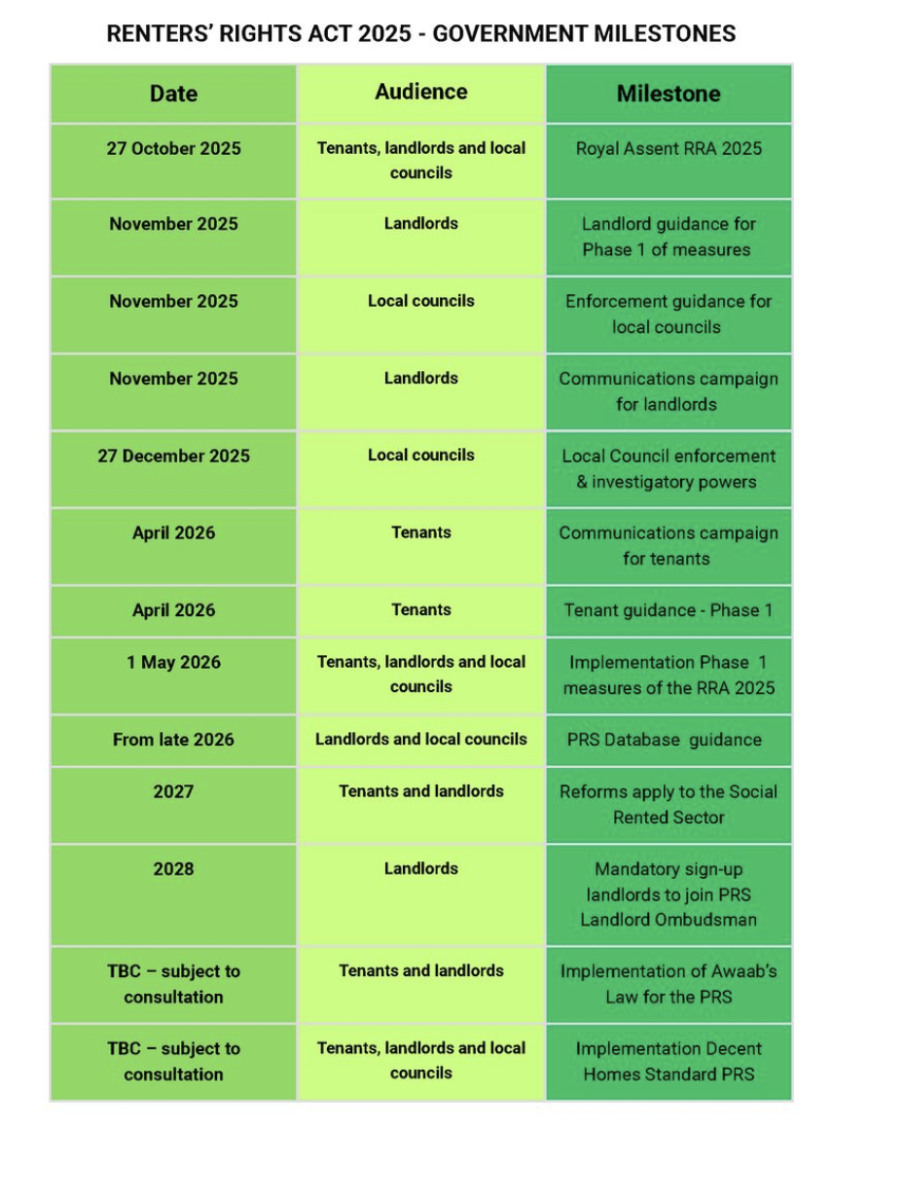On 13th November, the government published its roadmap for implementing the Renters’ Rights Act. Within this, we now know that 1st May 2026 will mark the first phase of the Act coming into force – although this will be only a partial implementation.
As a landlord, you need to act now to prepare as the risks of non-compliance and hefty fines loom large!
However, do remember that if you are a good landlord, have long-term tenants, keep up with the current and new laws, or use a qualified agent to fully manage your properties (verify the agents qualifications or membership of professional bodies), then you are likely to have little to worry about.
The Act brings significant reforms, but the government will introduce the changes in phases.
Phase 1 is due to be implemented on 1st May 2026:
- All tenancies will automatically switch to Assured Periodic Tenancies in the private rented sector (PRS), meaning any existing tenancies will cease, so if you had a one or two-year fixed tenancy, it will no longer be valid for you or the tenant.
- Ban rental bidding and rent in advance
- Make it illegal to discriminate against renters with children or those who receive benefits
- Require landlords to consider tenant requests to keep a pet, but there are lots of reasons why this might not be possible!
- Reform possession grounds to create a fairer system for both parties
- Abolish Section 21 ‘no-fault’ evictions
These changes represent some of the most significant reforms in decades, and some referred to this as the “Big Bang” date, leaving many landlords unsure where to start.
To help you prepare for the 1st May 2026 changes, here are the Top 5 things you should do now as a landlord to ensure you – and your tenant – are ready for the changes ahead.
1. Speak To Your Tenants
The changes affect tenants as much as landlords. Recent research from Housing Hand found that “75% of renters don’t understand how the Renters’ Rights Bill could impact them” (Housing Hand, August 2025). It is important to keep communication open and set expectations early. As a landlord, you will not need to change or re-issue the existing written tenancy agreement you have in place with your tenants who are on an assured shorthold tenancy (AST) agreement, but you will still need to inform them of the changes.
From the commencement date, you will be responsible for providing tenants in your properties with an information leaflet summarising the new rules by 31st May 2026. It is expected that the full information sheet will be made available online in March 2026.
Start planning how you will distribute this and begin discussing upcoming changes with your renters now, but it’s wise to let them know about the changes before Christmas, so it’s not a shock to them next year.
2. Review Your Portfolio
If you haven’t done so already, now’s a good time to review how your properties will be impacted by the various changes coming in, particularly:
- The shift to Assured Periodic Tenancies
- New limits on rent increases
- Potential pet requests
- Changes to possession grounds
- Removal of no-fault evictions
As a landlord, you should already be reviewing your portfolio to identify properties at higher risk of tenant turnover or requiring renegotiation of terms so you can plan accordingly.
It means not only assessing the contractual terms, but also the operational processes towards well-managed properties.
Although most of the changes are from May 1st 2026, from December 27th, local authorities will be given enhanced investigatory and enforcement powers, including the ability to request information, inspect rented properties and impose civil penalties where landlords breach their obligations.
This means the Local Authorities are much more likely to fine those in breach at the start of 2026.
3. Make Sure You or Your Letting Agent Are Ready
If you self-manage, ensure you fully understand the legal obligations you’ll take on from May 2026. The free 3-part expert video series on the Renters’ Rights Act on the LIS landlord Community Hub is a great place to start for understanding the new assured periodic tenancy system, how evictions will work, new obligations and fines.
Sign up or log in to the community hub for free here to get prepared today!
If you use a letting agent, check they:
- Are qualified and confirm membership in professional bodies such as Propertymark, ARLA or RICs.
- Verify redress scheme membership: All agents are required to belong to a redress scheme.
- Ask for qualifications from approved training providers
- Are aware of the phased implementation plan
- Have a compliance expert that you can talk to, and have already been training their staff
- Have processes which will adapt to the new tenancy agreements and are changing the way they assess tenants
- Can support you in handling tenant requests, rent reviews, possession claims,
Get written confirmation if possible; this protects you if anything is mishandled.
4. Contact Your Insurance Company
Your current landlord insurance may not fully cover risks under the new rules. Speak with your insurer about:
- Whether you’re protected for pet-related damage
- Any changes to the rent guarantee insurance requirement
- The impact of longer claim times if possession takes longer
- How the new eviction process affects legal cover
Review this early to avoid gaps in protection and to ensure you get the best deal with your insurance.
5. Plan Ahead for Pets, Repairs and Compliance Processes
With the new implied term that tenants can request a pet, landlords are required to consider it, and can reject the request if they have a good reason (small flat, not allowed in the lease, landlord is allergic). It is time to prepare how you will do this and embed the process within your operations.
To do so, you will need to:
- Decide the criteria you’ll use to approve or decline pet requests
- Check your insurance includes pet damage cover
- Update your tenancy agreement with clear pet clauses – but only if they are legal!
- Review your maintenance schedule, as longer tenancies may increase wear and tear
The downloadable pet profile template on the LIS Community Hub is a great place to start to understand what information you need about a tenant’s pet when making the request. Similarly, it’s a good idea for landlords to have a pet policy in place. The model pet policy by Suzanne Smith, The Independent Landlord, is a great resource to help landlords get started. Taking these steps now will help ensure a smooth transition once the first phase of the Act begins. It is important to note that tenants will also have to follow a strict procedure for requesting to have pets. You should also audit your compliance paperwork (EPC, gas safety, electrical certificates, etc.) to ensure a smooth transition to new tenancy structures.
Other Important Government Milestones
While 1st May 2026 is the key “big bang” date for the first phase of the Renters’ Rights Act, there are several milestones between now and then that landlords need to be aware of.
The Government’s roadmap to implementation guide and the visual timeline produced by the Guild of Letting and Management below is a useful guide to these upcoming changes.
 Source: Renters’ Rights Act- Government Milestones
Source: Renters’ Rights Act- Government Milestones
Beyond 1st May 2026, other important measures will also begin to take effect, including:
- New penalties for Category 1 Hazards in the PRS, expected in spring or summer 2026
- The launch of a PRS database from late 2026
- The introduction of a PRS Ombudsman in 2028
Two major reforms, Awaab’s Law and the extension of the Decent Homes Standard (DHS) of the private rented sector, currently have no confirmed implementation dates and remain subject to further consultation.
However, it’s important to be aware that many of the rules around maintenance and keeping a let property safe for tenants already require you to implement checks and solutions to issues such as damp/mould. The ‘get your property ready for winter checklist ‘is a great place to start.
Reaction from the experts
Let’s turn to our UK property industry experts we work with at the National Landlord Investment Show, to hear what they think about the roadmap and what landlords should be doing now:
Allison Thompson, National Lettings Managing Director, LRG, comments:
“The government’s roadmap gives much-needed clarity on how and when the Renters’ Rights Act will take effect, and the timeline confirms that landlords cannot afford to take a wait-and-see approach. With the first phase landing on 1st May 2026 and enforcement powers strengthening well before that, there is now real urgency to get your affairs in order. There are already more than 150 laws governing how a tenancy must be managed, and these new phased changes add further layers of responsibility. My advice is simple. Start talking to your letting agent now. Confirm they are qualified, fully trained on the new rules, and ready to update processes around periodic tenancies, possession routes, rent reviews and handling pet requests. Landlords who prepare early will be best placed to protect their investment, support their tenants and navigate the transition with confidence.”
David Smith, Partner at Spector, Constant & Williams, comments:
“It is very helpful that the government has published its roadmap for implementing the Renters’ Rights Act. It is also positive that it has given a clear idea for how the Act will dovetail with other changes, such as the move to higher Energy Performance Certificate standards. However, there is now a lot of pressure on landlords and agents who have to meet the timeline for next May and still do not have all the details from the various pieces of additional regulations that are yet to be produced. In particular, not providing the details of what needs to be in a tenancy agreement until January will make it difficult for those agreements to be produced in time. At this stage, landlords should be carefully reviewing the detailed guidance to the Act published by the government and using the time to become as familiar as possible with the changes.”
Susie Crolla, Managing Director of The Guild of Letting & Management Ltd, comments:
“This checklist provides landlords with the time-frames by which they need to ensure that their properties, systems, and processes are compliant. There can never be too much emphasis on learning and obtaining knowledge, which will prevent penalties for non-compliance.”
Suzanne Smith, Founder of The Independent Landlord, comments:
Stay Informed
With so many phased changes ahead, and only partial certainty on when each element will be implemented, it’s essential for landlords to stay informed and regularly review updates to remain compliant and prepared.
One of the best ways to stay educated is by attending free property events such as the National Landlord Investment Show, which offers expert-led education and direct access to expert property service providers…you can check out the 2026 dates and locations below and make sure they are in your diary!
- London – 24 March 2026 – Old Billingsgate
- Southampton – 14 April 2026 – SFC St Mary’s Stadium
- Kent – 29 April 2026- Ashford International Hotel
- Birmingham – 20 May 2026 – AVFC Villa Park
- London – 8 July 2026 – Old Billingsgate
- Bristol – 30 September 2026 – BCFC Ashton Gate
- Manchester – 13 October
- London 28 October – Old Billingsgate
You can also stay in the loop beyond the live shows through the free LIS Landlord Community Hub. Register for free to access expert market reports by Kate Faulkner OBE, guidance on the Renters’ Rights Act, helpful tools for Making Tax Digital and much free education to help you on your property investment journey. Sign up for free or log in to the Community Hub here.
























Comments